人教版高中英语选修七高二年级半月考试卷( 英语 )
人教版高中英语选修七第二学期高二级第二次月考试题.docx
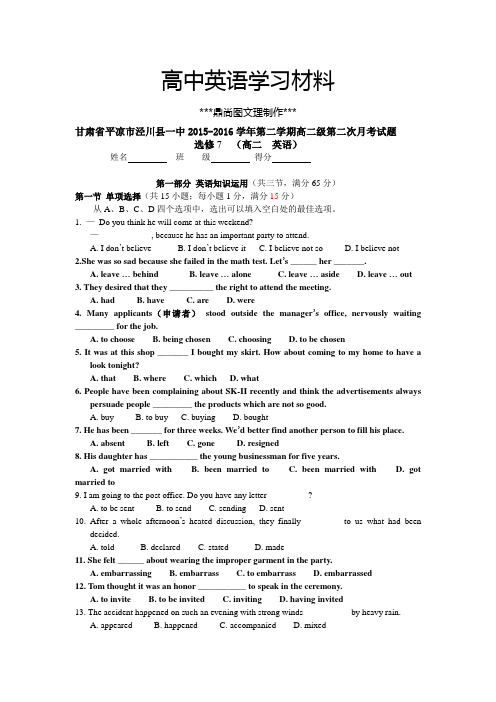
高中英语学习材料***鼎尚图文理制作***甘肃省平凉市泾川县一中2015-2016学年第二学期高二级第二次月考试题选修7(高二英语)姓名班级得分第一部分英语知识运用(共三节,满分65分)第一节单项选择(共15小题;每小题1分,满分15分)从A、B、C、D四个选项中,选出可以填入空白处的最佳选项。
1. —Do you think he will come at this weekend?—___________, because he has an important party to attend.A. I don’t believeB. I don’t believe itC. I believe not soD. I believe not2.She was so sad because she failed in the math test. Let’s ______ her _______.A. leave … behindB. leave … aloneC. leave … asideD. leave … out3. They desired that they __________ the right to attend the meeting.A. hadB. haveC. areD. were4. Many applicants(申请者)stood outside the manager’s office, nervously waiting _________ for the job.A. to chooseB. being chosenC. choosingD. to be chosen5. It was at this shop _______ I bought my skirt. How about coming to my home to have alook tonight?A. thatB. whereC. whichD. what6. People have been complaining about SK-II recently and think the advertisements alwayspersuade people _________ the products which are not so good.A. buyB. to buyC. buyingD. bought7. He has been _______ for three weeks. We’d better find another person to fill his place.A. absentB. leftC. goneD. resigned8. His daughter has ___________ the young businessman for five years.A. got married withB. been married toC. been married withD. got married to9. I am going to the post office. Do you have any letter _________?A. to be sentB. to sendC. sendingD. sent10. After a whole afternoon’s heated discussion, they finally ________ to us what had beendecided.A. toldB. declaredC. statedD. made11. She felt ______ about wearing the improper garment in the party.A. embarrassingB. embarrassC. to embarrassD. embarrassed12. Tom thought it was an honor ___________ to speak in the ceremony.A. to inviteB. to be invitedC. invitingD. having invited13. The accident happened on such an evening with strong winds __________ by heavy rain.A. appearedB. happenedC. accompaniedD. mixed14. The professor explained this theory so clearly that this phenomenon was easy enough________.A. for us to work outB. working outC. for working outD. to working out15. Her clear and elegant prose ______ her _______ from most other journalists.A. sets … asideB. sets … downC. sets … apartD. sets … up第二节完形填空(共20小题;每小题1.5分,满分30分)We should show respect to everybody, especially our elders because they are ahead of us —in age, in wisdom and maturity(成熟), in experience and education. Our 16 have done a lot for us, directly or indirectly and most of us 17 everything to their kindness and love.When we 18 them respect, whether it is by bowing to them, or 19 them with a smile, or offering them any help they need, it is one way of 20 our own love and gratitude (感激)to them 。
人教版高中英语选修七-第二学期高二月考英语试题
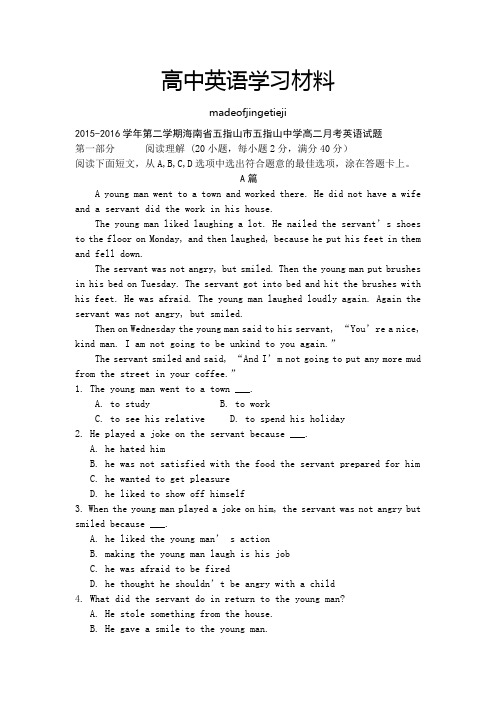
高中英语学习材料madeofjingetieji2015-2016学年第二学期海南省五指山市五指山中学高二月考英语试题第一部分阅读理解 (20小题,每小题2分,满分40分)阅读下面短文,从A,B,C,D选项中选出符合题意的最佳选项,涂在答题卡上。
A篇A young man went to a town and worked there. He did not have a wife and a servant did the work in his house.The young man liked laughing a lot. He nailed the servant’s shoes to the floor on Monday, and then laughed, because he put his feet in them and fell down.The servant was not angry, but smiled. Then the young man put brushes in his bed on Tuesday. The servant got into bed and hit the brushes with his feet. He was afraid. The young man laughed loudly again. Again the servant was not angry, but smiled.Then on Wednesday the young man said to his servant, “You’re a nice, kind man. I am not going to be unkind to you again.”The servant smiled and said, “And I’m not going to put any more mud from the street in your coffee.”1. The young man went to a town ___.A. to studyB. to workC. to see his relativeD. to spend his holiday2. He played a joke on the servant because ___.A. he hated himB. he was not satisfied with the food the servant prepared for himC. he wanted to get pleasureD. he liked to show off himself3. When the young man played a joke on him, the servant was not angry but smiled because ___.A. he liked the young man’ s actionB. making the young man laugh is his jobC. he was afraid to be firedD. he thought he shouldn’t be angry with a child4. What did the servant do in return to the young man?A. He stole something from the house.B. He gave a smile to the young man.C. He had a fight with him.D. He put mud into the young man’s coffee.B篇As a boy, Sanders was much influenced(影响) by books about the sea, but by the age of fifteen he had decided to become a doctor rather than a sailor. His father was a doctor. So he was often with the doctors and got along very well with them. When he was fourteen, he was already hanging around the hospital where he was supposed to be helping to clean the medicine bottles, but was actually trying to listen to the doctors’ conversations with patients in the next room.During the war Sanders served in the army as a surgeon(外科医生). “That was the happiest time of my life. I was dealing with real sufferers and on the whole making a success of my job.” In Rhodes he taught the country people simple facts about medicine. He saw himself as a life-saver. He had proved his skill to himself and had a firm belief that he could serve those who lived simply, and were dependent upon him. Thus, while in a position to tell them what to do he could feel he was serving them.After the war, he married and set up a practice deep in the English countryside, working under an old doctor who hated the sight of blood. This gave the younger man plenty of opportunity(机会) to go on working as a life-saver.5. When he was a small boy, books about the sea had made Sanders want to be ___.A. a surgeonB. an army manC. a sailorD. a life-saver6. At the age of 14, Sanders ___.A. worked as a doctor by cleaning the medicine bottlesB. met some doctors who were very friendly to himC. was interested in talking with patientsD. remained together with the doctors7. His experience in the Army proved that ___.A. he was good at medical operations on the woundedB. he succeeded in teaching people how to save their lives themselvesC. a doctor was the happiest manD. his wish of being a life-saver could hardly come true8. When the war was over, he ___.A. learned from an old doctor because he was popularB. started to hate the sight of blood while workingC. served the countrymen under an old doctor who needed someone to help himD. had few chances to be a “life-saver” because he was youngerC篇In 1933 an unknown American called Clarence Nash went to see the film-maker Walter Disney. He had an unusual voice and he wanted to work in Disney’s cartoon film for children. When Walter Disney heard Nash’s voice, he said, “Stop! That’s our duck!”The duck was the now-famous Donald Duck, who first appeared in 1934 in the film, The Wise Little Hen. Donald lived in an old houseboat and worn his sailor jacket and hat. Later that year he became a star after an eight minute Mickey Mouse film. The cinema audiences liked him because he was lazy and greedy, and because he lost his temper very easily. And they loved his voice when he became angry with Mickey’s eight nephews. Soon Donald was more popular than Mickey Mouse himself, probably because he wasn’t a goody-goody, like Mickey.In the 1930s, 1940s, and 1950s, Donald and his friends Mickey, Goofy and Pluto made hundreds of Disney cartoons. He also made educational film about the place of the USA in the world, and safety in the home. Then in 1966 Donald Duck and his voice disappeared—there were no more new cartoons.Clarence Nash died in February, 1985. But today’s children can still see the old cartoons on the television and hear that famous voice.9. Who made Donald Duck cartoons?A. Mickey Mouse.B. Clarence Nash.C. Walter Disney.D. Pluto.10. When did the first Donald Duck film appear?A. In 1933B. In 1934C. In 1966D. In 196511. Who was Clarence Nash?A. A cartoonist.B. A writer.C. A film maker.D. The man who made the voice for Donald Duck.12. Where do today’s children see Donald Duck cartoons?A. In new cartoons.B. At the cinema.C. On television.D. In the theater.D篇As we all know, it was Thomas Jefferson who wrote the Declaration of the Independence. He wrote it in two weeks, and after a few changes, it was accepted by the Congress. As a result, he became famous.Born in Virginia, Thomas Jefferson, a brilliant student at school and almost talented lawyer later, was much interested in politics.Jefferson was elected Governor of Virginia in 1779, and he was sent to France as the representative of the American government in 1784. Sixteen years later, at the age of 57, he was elected president after Washington and Adams.Far from a handsome man, he was tall with long arms and big hands. Jefferson, who was an amusing talker in conversation but a poor speaker, was generally good-nature.Jefferson was regarded as a defender of freedom on America. As a president, he protected the right of free speech. Interestingly enough, in his eight years as President, Jefferson never vetoed a bill which Congress had passed. He did a lot in organizing the new University of Virginia.Thomas Jefferson died on July the fourth, 1826, the 50th anniversary of American Independence.13. From the passage we can infer that America won its independence in ___.A. 1786B. 1776C. 1842D. 180014. Which of the following statements is true?A. Jefferson was not only very talented but also very handsome.B. Jefferson was not an easy person to get along with.C. Jefferson was an amusing talker, but not good at speaking in public.D. Not being politically-minded, Jefferson never vetoed a bill passed by the Congress.15. Jefferson died when he was ____.A.72B. 73C. 83D. 92E篇(七选五)从选项A,B,C,D,E,F中选出五个,使文章通顺。
人教版高中英语选修七高二下学期第一次月考英语试题
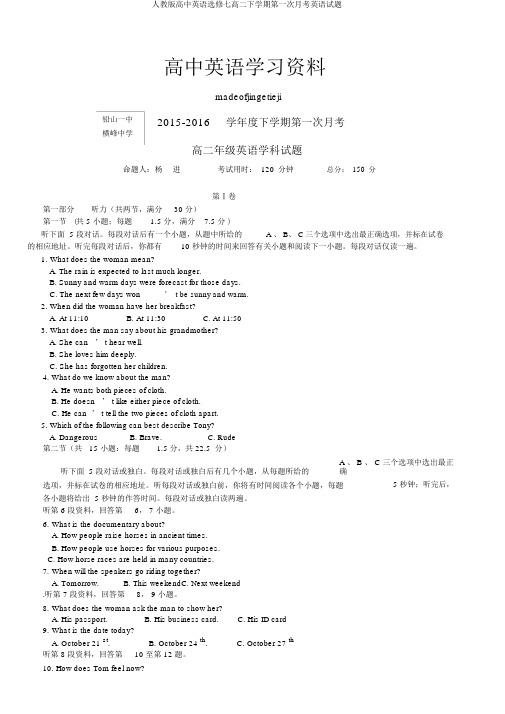
高中英语学习资料铅山一中横峰中学madeofjingetieji2015-2016学年度下学期第一次月考高二年级英语学科试题命题人:杨进考试用时:120分钟总分:150分第Ⅰ卷第一部分听力(共两节,满分30 分)第一节(共5小题;每题 1.5 分,满分7.5 分)听下面 5 段对话。
每段对话后有一个小题,从题中所给的 A 、 B、 C 三个选项中选出最正确选项,并标在试卷的相应地址。
听完每段对话后,你都有10 秒钟的时间来回答有关小题和阅读下一小题。
每段对话仅读一遍。
1.What does the woman mean?A.The rain is expected to last much longer.B.Sunny and warm days were forecast for those days.C. The next few days won’ t be sunny and warm.2. When did the woman have her breakfast?A. At 11:10B. At 11:30C. At 11:503.What does the man say about his grandmother?A.She can ’ t hear well.B.She loves him deeply.C.She has forgotten her children.4.What do we know about the man?A.He wants both pieces of cloth.B.He doesn ’ t like either piece of cloth.C.He can ’ t tell the two pieces of cloth apart.5. Which of the following can best describe Tony?A. DangerousB. Brave.C. Rude第二节(共15 小题:每题 1.5 分,共 22.5 分)听下面 5 段对话或独白。
人教版高中英语选修七第一学期高二第二次月考(英语试卷)
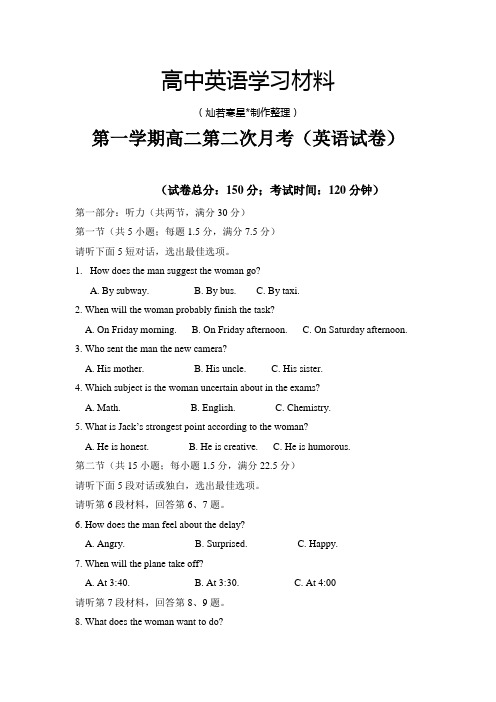
高中英语学习材料(灿若寒星*制作整理)第一学期高二第二次月考(英语试卷)(试卷总分:150分;考试时间:120分钟)第一部分:听力(共两节,满分30分)第一节(共5小题;每题1.5分,满分7.5分)请听下面5短对话,选出最佳选项。
1.How does the man suggest the woman go?A. By subway.B. By bus.C. By taxi.2. When will the woman probably finish the task?A. On Friday morning.B. On Friday afternoon.C. On Saturday afternoon.3. Who sent the man the new camera?A. His mother.B. His uncle.C. His sister.4. Which subject is the woman uncertain about in the exams?A. Math.B. English.C. Chemistry.5. What is Jack’s strongest point according to the woman?A. He is honest.B. He is creative.C. He is humorous.第二节(共15小题;每小题1.5分,满分22.5分)请听下面5段对话或独白,选出最佳选项。
请听第6段材料,回答第6、7题。
6. How does the man feel about the delay?A. Angry.B. Surprised.C. Happy.7. When will the plane take off?A. At 3:40.B. At 3:30.C. At 4:00请听第7段材料,回答第8、9题。
8. What does the woman want to do?A. Exchange her watch.B. Get her watch back.C. Have her watch repaired.9. What time of the day is it probably now?A. In the morning.B. At noon.C. In the late afternoon. 请听第8段材料,回答第10至12题。
人教版高中英语选修七-高二4月月考英语试题 (2)
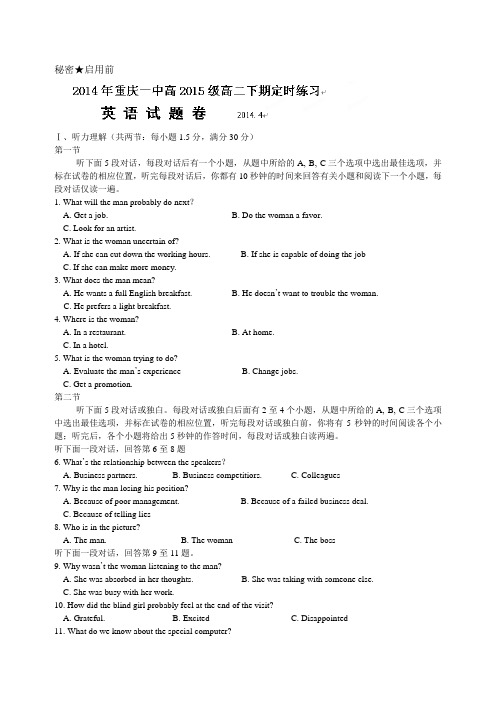
秘密★启用前Ⅰ、听力理解(共两节:每小题1.5分,满分30分)第一节听下面5段对话,每段对话后有一个小题,从题中所给的A, B, C三个选项中选出最佳选项,并标在试卷的相应位置,听完每段对话后,你都有10秒钟的时间来回答有关小题和阅读下一个小题,每段对话仅读一遍。
1. What will the man probably do next?A. Get a job.B. Do the woman a favor.C. Look for an artist.2. What is the woman uncertain of?A. If she can cut down the working hours.B. If she is capable of doing the jobC. If she can make more money.3. What does the man mean?A. He wants a full English breakfast.B. He doesn’t want to trouble the woman.C. He prefers a light breakfast.4. Where is the woman?A. In a restaurant.B. At home.C. In a hotel.5. What is the woman trying to do?A. Evaluate the man’s experienceB. Change jobs.C. Get a promotion.第二节听下面5段对话或独白。
每段对话或独白后面有2至4个小题,从题中所给的A, B, C三个选项中选出最佳选项,并标在试卷的相应位置,听完每段对话或独白前,你将有5秒钟的时间阅读各个小题;听完后,各个小题将给出5秒钟的作答时间,每段对话或独白读两遍。
听下面一段对话,回答第6至8题6. What’s the relationship between the speakers?A. Business partners.B. Business competitiors.C. Colleagues7. Why is the man losing his position?A. Because of poor management.B. Because of a failed business deal.C. Because of telling lies8. Who is in the picture?A. The man.B. The womanC. The boss听下面一段对话,回答第9至11题。
人教版高中英语选修七—第二学期高二月考

高中英语学习材料(灿若寒星*制作整理)2010—2011学年第二学期高二月考英语试题(2011、3)注意事项:1.本试卷分第Ⅰ卷(选择题)和第Ⅱ卷(非选择题)两部分,共10页,共120分;考试时间120分钟。
2.答卷前,考生务必将自己的姓名、考生号、考试科目涂写在答题卡上;3.选择题每小题选出答案后,用2B铅笔将答题卡上对应题目的选项标号涂黑,如需改动,用橡皮擦干净后,再选涂其它选项标号,答在试题卷上无效;4.非选择题用黑色签字笔直接答在答题卡对应的答题区域内,答在试题卷上无效。
考试结束后,只上交答题卡(即第二卷)。
第一卷第一节(共5小题;每小题1.5分,满分7.5分)听下面5段对话。
每段对话后又一个小题,从题中所给的A、B、C 三个选项中选出最佳选项,并标在试卷的相应位置。
听完每段对话后,你都有10秒钟的时间来回答有关小题和阅读下一小题。
每段对话仅读一遍。
1.How will the man get to the station most probably?A. By busB. By taxiC. By car2. What do we know about their talks?A. They haven’t started yet.B. They haven’t achieved much.C. They could go no further.3. What does the man mean?A. Fred Ashley is busy.B. The woman must have dialed the wrong number.C. The woman has to go to the bank herself.4. What does the man advise the woman to do?A. Buy a computer.B. Use Martha’s computer.C. Stop visiting Martha.5. Why was the man late?A. He had a talk with his boss.B. He telephoned a friend after work.C. He met a foreign businessman.第二节(共15小题;每小题1.5分,满分22.5分)听下面5段对话。
人教版高中英语选修七高级高二下半期考试
高中英语学习材料madeofjingetieji高2013级高二下半期考试说明: 本试卷共两卷, 第一卷和第二卷。
第一卷的答案请涂在答题卡上, 第二卷的答案请写在答题卡上的规定位置。
交卷时交答题卡。
试卷总分为150分, 考试时间为120分钟。
第一卷(选择题,共100分)第一部分听力测试(共两节,满分30分)第一节(共5小题;每小题1.5分,满分7.5分)听下面5段对话。
每段对话后有一个小题,从题中所给的A、B、C三个选项中选出最佳选项,并转涂在答题卡上相应的位置。
听完每段对话后,你都有10秒钟的时间来回答有关小题和阅读下一小题。
每段对话仅读一遍。
1.When will Eric arrive?A. At about 10:30B. At about 10:50C. At about 11:202.What will the woman buy?A. NewspapersB. PostcardsC. Stamps3.Where is the man heading?A. To a parkB. To a train stationC. To a restaurant4.What did the man think of the lecture?A. FascinatingB. LongC. Useful5.What are the speakers mainly talking about?A. A professorB. A meetingC. A report第二节(共15小题;每小题1.5分,满分22.5分)听下面5段对话或独白。
每段对话或独白后有几个小题,从每题所给的A、B、C三个选项中选出最佳选项,并标在试卷的相应位置。
听每段对话或独白前,你将有时间阅读各个小题,每小题5秒钟;听完后,各小题将给出5秒钟的作答时间。
每段对话或独白读两遍。
听第6段材料,回答6,7 题。
6. Why does the woman apologize?A. She couldn’t pay for the man’s b roken cupB. Her daughter broke the man’s cup.C. She forgot to buy some cups for the man.7.Who is Betty?A. The man’s daughterB. The man’s wifeC. The woman’s daughter听第7段材料,回答8,9 题。
人教版高中英语选修七高二下学期第一次月考英语试题 (2)
高中英语学习材料(灿若寒星*制作整理)泸州高中2014级高二下学期月考试题英语(考试时间120分钟满分150分)第I卷第一部分:听力(共两节,满分30分)第一节(共5小题;每小题1.5分,满分7.5分)听下面5段对话。
每段对话后有一个小题,从题中给出的A、B、C三个选项中选出最佳选项,并标在试卷的相应位置。
听完每段对话后,你有10秒钟的时间来回答有关小题和阅读下一小题。
每段对话仅读一遍。
1. How much do the speakers need to pay?A. £15.B. £20.C. £30.2. What will the speakers buy tickets for?A. A game.B. A film.C. A concert.3. Why does the man want to give up the photocopier(复印机)?A. It is noisy.B. It is difficult to use.C. It doesn’t work properly.4. What are the speakers mainly discussing?A. How to sort out (分类)rubbish.B. How to guarantee city safety.C. How to protect the environment.5. What does the man mean?A. He must check the woman’s age.B. The disco is for the over-18-year-olds.C. The woman looks younger than she really is.第二节 (共15小题;每小题1.5,满分22.5分)听下面5段对话。
每段对话后有几个小题,从题中所给的A、B、C三个选项中选出最佳选项,并标在试卷的相应位置。
人教版高中英语选修七高二下学期第一次月考英语试题
1. What color is the boss's hair?A. Brown.B. Blonde.C. Dark.2. What can the man get for booking three nights?A. $50 in cash.B. A shopping card.C. A gas card.3. What does the girl say about her new classmates?A. It's difficult to know all of them.B. They are very clever.C. They are indifferent.4. Where does the conversation take place?A. In a clothing store.B. At the woman's.C. In a ballroom.5. How much does the man cut the price?A. $20.B. $25.C. $45.第二节听下面5段对话或独白。
每段对话或独白后有几个小题, 从题中所给的A、B、C三个选项中选出最佳选项, 并标在试卷的相应位置。
听每段对话或独白前, 你将有时间阅读各个小题, 每小题5秒钟;听完后, 各小题将给出5秒钟的作答时间。
每段对话或独白读两遍。
听下面一段对话, 回答第6和第7两个小题。
6. Where are the speakers?A. At the Lost and Found.B. At a bus stop.C. In a shop.7. What does the man mean at last?A. He tries to find the coat.B. He doesn't sell coats like that.C. He didn't see a coat like that.听下面一段对话, 回答第8和第9两个小题。
人教版高中英语选修七高二下学期第一次月考(英语).docx
高中英语学习材料***鼎尚图文理制作***山东省聊城市高唐一中10-11学年高二下学期第一次月考英语考试范围book7module1&2&3第Ⅰ卷第一部分:听力(共20小题,每题1分,满分20分)略第二部分:英语知识运用第一节;单项选择(共15小题;每小题1分,满分15)21. ----Do you take _______possession of the jewels?-----No. My mother is in ________possession of them.A. the; theB. the; /C. /; /D. /; the22. The thief was brought in, his hands ____________ behind his back.A. had been tiedB. tiedC. being tiedD. having tied23 ---Are you still thinking about yesterday’s game?---Oh. That’s.A.what makes me feel excited B.whatever I feel excited aboutC.how I feel about it D.when I feel excited24.Although difficult, she finished the job on time, so I think she certainly deserved________.A. being praisedB. to be praisedC. to praiseD. having praised25._______I want to know is __________I can master English in the shortest time.A. What; howB. How; whatC. Which; whatD. What; what26. Was it in the village _______we used to live in _________the accident happened?A. where; thatB. which; thatC. that; whereD. where; which27. Seeing her father come back, _________.A. tears ran down her cheeksB. Her tears ran outC. she burst into tearsD. She burst into crying28. So ______ had he been in watching the car passing by that he didn’t notice his friends..A. disturbedB. surprisedC. excitedD. absorbed29. The aim of basketball is for players to get a ball into the “basket”: a net ____ from a metal circle.A. hangedB. hangingC. to hangD. being hung30. No sooner _____ the news than they rushed out into the street.A. they heardB. they had heardC. did they hearD. had they heard31. --- I think we can’t repair the d amaged car in the small town.--- We are considering _____ to Beijing to have it repaired.A. to goB. goingC. to have goneD. having gone32. There was a teapot shaped like a duck, out of ______ mouth the tea was supposed to come.A. whoseB. whichC. itsD. that33. There is some doubt _____ she will be able to repay the money on timeA. thatB. whichC. whetherD. why34. ----How about eight o’clock outside the cinema?---That ____ me fine.A. fitsB. suitsC. meetsD. satisfies35. _______, Jack couldn’t get the door open. He had to dial 119.A. As he might tryB. Try as he mightC. As might he tryD. Might as he try第二节:完形填空(共20个小题。
- 1、下载文档前请自行甄别文档内容的完整性,平台不提供额外的编辑、内容补充、找答案等附加服务。
- 2、"仅部分预览"的文档,不可在线预览部分如存在完整性等问题,可反馈申请退款(可完整预览的文档不适用该条件!)。
- 3、如文档侵犯您的权益,请联系客服反馈,我们会尽快为您处理(人工客服工作时间:9:00-18:30)。
高二年级半月考试卷(英语)使用时间:2015年4月2日测试时间: 90分钟总分: 120分第一部分阅读理解(共两节,满分40分)第一节(共15小题;每小题2分,满分30分)AA woman who lived in a coma(昏迷)for 42 years, unendingly cared for by her family, died Wednesday in her home in Miami Gardens, Fla.Edwarda O’Bara was a 17-year-old high school student in 1970 when she became sick from her diabetes(糖尿病)medication and slipped into a diabetic coma. Just before she lost consciousness, Edwarda asked her mother, Kaye O’Bara, to never leave her side, and her family never d id.Edwarda’s father, Joe O’Bara, and Kaye took care of their daughter—reading to her, playing her music, making sure she was turned every two hours, bathed, given insulin(胰岛素)and given nourishment through a feeding tube—until their deaths in 1976 and 2008, respectively. After that, Edwarda’s sister Colleen O’Bara took over.Her family’s unending care for her became a story told across the world. And visitors from across the world traveled to the Miami Gardens home every year, sometimes appearing at the doorstep on random days, other times for Edwarda’s yearly birthday party, a cheerful affair with decorations, balloons and cake.Through it all, Edwarda remained in a coma. But to her family and followers she remained alive. Colleen O’Bara described her as “the best sister in the whole wide world.”“She taught me so much, especially after she was in the coma, ” Colleen O’Bara said, “She taught me so much about unconditional love that I couldn’t say I had it before. She taught me about patience that I didn’t have before. I learned so much from taking care of my sister. It’s like I grew up overnight. ”In an announcement of Edwarda’s death posted Thursday on a website, Colleen O’Bara wrote: “Yesterday while taking care of Edwarda I noticed her looking directly a t me and gave me the biggest smile I had ever seen. She then closed her eyes and joined my Mom in Heaven. ”1. How old was Edwarda O’Bara when she died?A. 56.B. 57.C. 58.D. 59.2. Edwarda’s parents did everyt hing below to take care of her EXCEPT_____________.A. reading to herB. playing her musicC. taking a walk with herD. turning her every two hours3. What’s the main idea of the passage?A. Edwarda’s family’s selfless care for her became a story told across the world.B. Edwarda became sick from her diabetes medication and slipped into a diabetic coma.C. Edwarda died after 42 years of coma and her family kept their promise to take good care of her.D. Edwarda smiled when she died.BWhen Josephine Cooper was growing up, she learned the importance of charity from her parents.Although they made a modest living for their family of 10, they insisted on sharing with those less fortunate.Half a century later, Mrs. Cooper became a beloved volunteer at the San Diego Food Bank, where she devoted herself to helping others. She organized and ran a distribution center from a church, helping it become the organization's largest emergency food distribution center in San Diego. She was one of 25 outstanding senior volunteers in the nation selected and invited to Washington D.C. to receive the award."She was the main person who helped us make that program grow," said Mike Doody, former director of the Food Bank. "She had a way of getting people to work together and to work hard. She was determined and stubborn, but in a good way. She had a good heart." People knew her as "Grandma" because of her selflessness and her devotion to helping hungry children and families. "She reminded people of their Grandma." Doody said.As a widow with a young child in 1979, Mrs. Cooper was helped through a difficult financial time when the Food Bank provided her with groceries. "She devoted her life to giving back," said her daughter, Monica Cooper. It wasn't unusual for a local church to call Mrs. Cooper to ask her to aid a needy family. "She would give people food out of her cupboard. Sometimes we would cook a meal for a family living out of their car," Cooper said. Although Mrs. Cooper was honored to receive the national award for her volunteer work, she said being able to help others was her reward. She died of liver disease and kidney failure, aged 93.4. The underlined word "charity" in Paragraph 1 refers to _____.A. offering helpB. donating moneyC. providing servicesD. showing sympathy5. The San Diego Food Bank is meant to _____.A. distribute food in case of emergencyB. help hungry children and familiesC. give basic first-aid treatmentD. train some senior volunteers6. Which of the following is true of Mrs. Cooper?A. She died at an early age.B. She refused the national award.C. She was kind and devoted.D. She was not easy to get along with.7. Mrs Cooper's story suggests that _____.A. everyone needs a Grandma nearbyB. children are what their parents areC. a sound mind is in a sound bodyD. a mother's love never changesCInformal conversation is an important part of any business relationship. Before you start a discussion, however, make sure you understand which topics are suitable and which are considered taboo (禁忌) in a particular culture. Latin Americans enjoy sharing information about their local history, art and customs. You may expect questions about your family, and be sure to show pictures of your children. You may feel free to ask similar questions of your Latin American friends. The French think of conversation as an art form, and they enjoy the value of lively discussions as well as disagreements. For them, arguments can be interesting and they can cover pretty much or any topic-as long as they occur in a respectful and intelligent manner.In the United States, business people like to discuss a wide range of topics, including opinions about work, family, hobbies, and politics. In Japan, China, and Korea, however, people are much more private. They do not share much about their thoughts, feelings, or emotions because they feel that doing so might take away from the harmonious business relationship they're trying to build. Middle Easterners are also private about their personal lives and family matters. It is considered rude, for example, to ask a businessman from Saudi Arabia about his wife or children.As a general rule, it's best not to talk about politics or religion with your business friends. This can get you into trouble, even in the United States, where people hold different religious views. In addition, discussing one's salary is usually considered unsuitable. Sports is typically a friendly subject in most parts of the world, although be careful not to criticize a national sport. Instead, be friendly and praise your host's team.8. Which is typically a friendly topic in most places according to the author?A. Sports.B. Children.C. Personal feelings.D. Families.9. Why are people from Asia more private in their conversation with others?A. They don't want to talk much with others.B. They don't want to have their good relationship with others harmed by informal conversation.C. They are afraid to argue with their colleagues.D. They want to keep their feelings to themselves.10. The author considers politics and religion _____.A. cheerful topicsB. taboosC. rude topicsD. topics that sometimes can be talked about11.What shouldn't you do when talking about sports with colleagues from another country?A. Praising your own country's sports.B. Criticizing your own country's sports.C. Praising the sports of your colleagues' country.D. Criticizing the sports of your colleagues' country.DAs many as one thousand years ago in the Southwest, the Hopi and Zuni Indians of North America were building with adobe-sun baked brick plastered (涂抹)with mud. Their homes looked remarkably like modern apartment houses. Some were four stories high and contained quarters for perhaps one thousand people, along with store rooms for grain and other goods.These buildings were usually put up against cliffs, both to make construction easier and for defense against enemies. They were really villages in themselves, as later Spanish explorers must have realized since they called them "pueblos", which is Spanish for town. The people of the pueblos raised what are called "the three sisters"-corn, beans, and squash(南瓜). They could make excellent pottery and weave marvelous baskets, some so fine that they could hold water. The Southwest has always been a dry country, where water is scarce. The Hopi and Zuni brought water from streams to their fields and gardens through irrigation(灌溉) ditches(沟渠).Water was so important that it played a major role in their religion. They developed elaborate(精心制作的)ceremonies and religious rituals(礼仪)to bring rain. The way of life of less settledgroups was simpler and more strongly influenced by nature. Small tribes such as the Shoshone and Ute wandered the dry and mountainous lands between the Rocky Mountains and the Pacific Ocean. They gathered seeds and hunted small animals such as rabbits and snakes. In the Far North the ancestors of today's Inuit hunted seals, walruses(海象), and the great whales. They lived right on the frozen seas in shelters called igloos(冰屋) built of blocks of packed snow. When summer came, they fished for salmon(鲑)and hunted the lordly caribou(北美驯鹿).The Cheyenne, Pawnee, and Sioux tribes, known as the Plains Indians, lived on the grasslands between the Rocky Mountains and the Mississippi River. They hunted bison (野牛)commonly called the buffalo. Its meat was the chief food of these tribes, and its hide(毛皮)was used to make their clothing and the covering of their tents and tipis(美国印第安人的圆锥形帐篷).12. What does the text mainly discuss?A. The architecture of early American Indian buildings.B. The movement of American Indians across North America.C. Ceremonies and rituals of American Indians.D. The way of life of American Indian tribes in early North America.13. It can be inferred from the text that the buildings of the Hopi and Zuni were ________.A. very smallB. highly advancedC. difficult to defendD. quickly constructed14. Which of the following is true?A. The Spanish explorers didn't know what the buildings really was, as they called it "pueblos".B. The Hopi and Zuni had no idea of how to farm.C. The people of the pueblos were good at weaving.D. Since water was so important, the people of the pueblos wove baskets to carry water.15. What information can you get from the text?A. The Plains Indians lived on bison.B. The majority of the American Indians lived in igloos.C. The Hopi and Zuni had a smaller population.D. The lands between the Rocky Mountains and the Mississippi River were dry.第二节(共5小题;每小题2分,满分10分)根据短文内容,从短文后的选项中选出能填入空白处的最佳选项。
